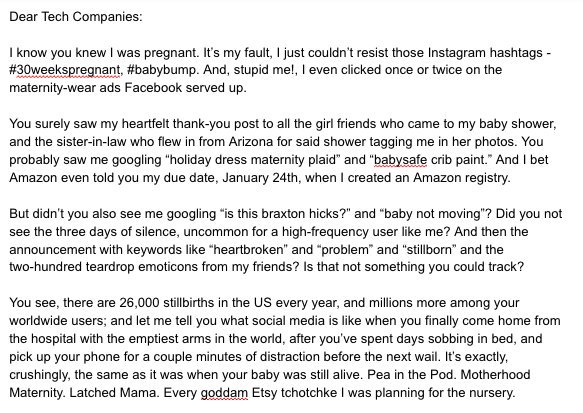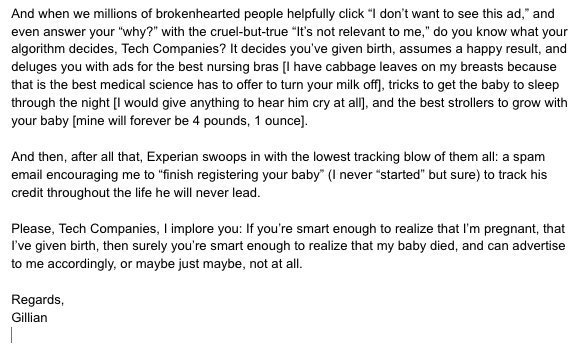Cheers from a camper trailer of sorts on a farm an hour outside of Portland. We got here this afternoon, and will be out on the farm tomorrow. Wooo. It's raining pretty hard outside. Something about the experience seems more powerful. Were we to be camping right now, the tent would be soaked. We aren't quite camping, yet like still sleeping in a sleeping bag, gotta go outside through a path to get to the house/restroom, etc. And to hear the rain now, you really can 'feel' the shelter of it all. It's remarkable. I definiely don't notice while in the city.
Tweet tweet
A good friend of mine, Neil, shared with me this post from twitter:
Here's the screenshot:


And thus like many one-off shares, we proceeded to ramble:
Like can these platforms be used to help those who are grieving or going through something
Start googling ‘terminal cancer’ and they’ll be selling you caskets!
Profiting off grief :/
(And then here was my reply, in a long string of texts, cleaned up and expanded slightly.)
Then vs Now
It would be a good advertising move to put a big billboard for burial services outside of a hospice. You’re letting the customer know about an important service they (or family who may visit) will surely need. Except the thought of a big advertisement outside the hospice would, for most, insult our very sense of humanity. And the problem isn't that people are profiting off of death/dying. There is a whole death-related industry, and many of them no doubt do amazing work that uplift friends and families who had loved ones who passed away.
More can be said on this, and other examples discussed. But bottom line--we realize there are more emotionally-intelligent ways of going about marketing one's funeral services than putting up that billboard in front of a hospice.
And so one big differences with past adtech and current--in the past things were done manually by a person who could catch any errors easily. Doing it digitally will (may at least at first) not catch them. Like in the letter from twitter above.
There are quadrillions+ web pages, each one representing a potential billboard space. Monetizing the web through advertising manually would be impossible. So, we have these digital ad empires built off of algorithmic decision making.
I'm not so familiar with the space, nor will pretend to be. But at some level in the ad chain someone/people is making decisions to the extent of control and how much human intervention to ensure things like the twitter letter don't happen. But standing back, the general vibe I get--from nothing scientific--is that the approach is move first, break, and fix later. (There's of course a biased sample pool--we see from the news what is broken, not all the times the algorithm could've showed something not matching the audience but didn't.) And there are no doubt countless PhD's and a lot of resources going to helping address this.
More broadly--people talk about self-driving cars and the ethics behind it. There it is life and death so it’s more obvious how we wouldn’t necessarily just want it up to the discretion of computer code who lives/dies. But ethics touches all parts of tech and anytime you have created a rule for decision making that isn’t overseen by humans—you’re gonna run into problems. And our intuition for how ethics should work also gets jammed up because it’s easier to think about the case of how to treat and respond to an advertising agent who puts a billboard for caskets outside of a hospice, but less clear when it was done through some complex algorithmic decision-making process.
How to respond? I don't think it needs to be an anti-capitalist response. It’s less about the economic framework or who has more control over the economy's levers, but the humanity we take to what we do as a society (regardless of how operationally it gets done). Stalin had good control over the economy, but I wouldn't expect a government of his to create the environment for a better response to our twitter-letter problem above. It's I guess something more ephemeral that permeates everything from our institutions down to the conversations we have on the street.
Anyway, just some quick thoughts there. Until then, onwards and upwards.
If you enjoy this kind of stuff, click here to stay in the loop.